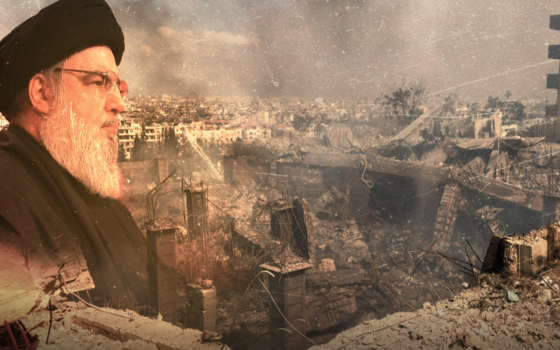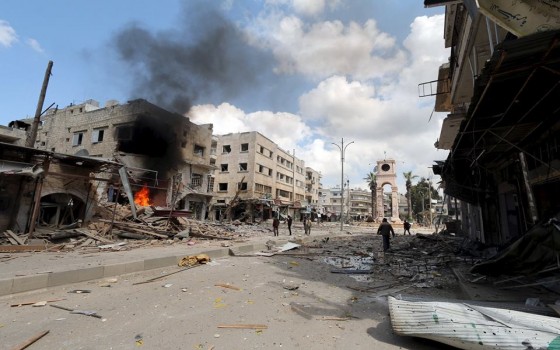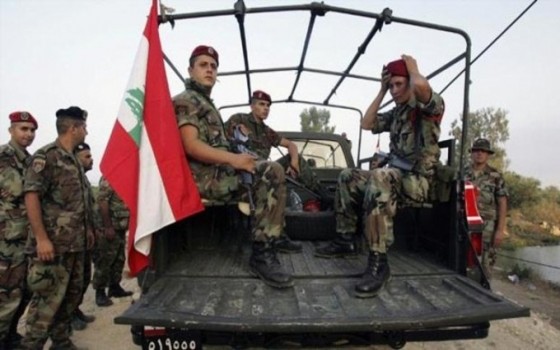
Revealing the behind-the-scenes details of Nasrallah's assassination and the Al-Aqsa Flood attack... An Iranian Revolutionary Guard commander: "Israel was unable to achieve its goals despite military superiority and American and Western support."

- Europe and Arabs
- Sunday , 5 October 2025 5:53 AM GMT
Tehran - Beirut: Europe and the Arabs
The commander of the Quds Force of the Iranian Revolutionary Guard Corps, Brigadier General Esmail Qaani, revealed that Israel used chemical agents along with heavy bombs in the attack that killed former Hezbollah Secretary-General Hassan Nasrallah, describing what happened as a "clear war crime."
In a televised interview, Qaani explained that this attack came after a series of Israeli operations, including the targeting of field commanders and the explosion of pagers, before the strike that killed Nasrallah.
He said that Israel "could not withstand the pressure of Hezbollah, which occupied a third of its military capabilities in southern Lebanon, which led to a shift in the balance of power in the war."
He pointed out that "Nasrallah was not just a leader of the party, but a symbol and a fundamental pillar in Lebanon, whom people could rely on in major crises." He added that "Israel waged the fiercest war in its history against Hezbollah with direct support from the United States, NATO, and a number of governments that raised Islamic slogans."
"Nasrallah planned meticulously and faced the war with steadfastness," according to the Brussels-based Euronews website.
In a related context, Qaani spoke of Nasrallah's "wisdom" in managing the battle, adding: "While no one was aware of the start of Operation Flood of Al-Aqsa, Nasrallah meticulously and systematically determined the necessary stages."
He added: "Sensing the social conditions in Lebanon, Nasrallah carefully planned the start of the operation, deciding to launch it on a night when the south would be deserted. This choice was a clear example of his wise and duty-based planning, which was executed quickly and successfully."
Qaani recalled that Nasrallah, until his death, challenged Israel in psychological and military warfare with foresight and resilience at crucial moments, noting that "in the painful incident of the pager explosion, Nasrallah stood firm, exemplary."
He emphasized that "his spiritual and strategic vision kept Hezbollah and the people steadfast in the most difficult circumstances," adding, "Despite fears for his life, extensive security measures were taken, but ultimately, martyrdom was the fate of this great leader."
An Unprecedented War
Qaani noted that the war Hezbollah waged against Israel "lasted 66 days under unprecedented military pressure, using the world's most advanced weapons." He explained that "the secret of the party's resilience was the centralized and precise planning of operations."
He explained that "each region contained separate units and special command centers. Even the smallest units were self-sufficient and capable of carrying out their missions without direct orders."
He said that "delivering capabilities under those circumstances was extremely difficult, but Hezbollah managed to persevere despite all the obstacles," adding that "Israel requested a ceasefire because it had failed to disarm or eliminate the party."
Nasrallah and Safi al-Din
The commander of the Quds Force affirmed that "Nasrallah and his successor, Hashem Safi al-Din, formed the pillars of leadership in Hezbollah," noting that "Safi al-Din, who was the party's executive officer, maintained steadfastness after Nasrallah's assassination."
He explained that "Safi al-Din oversaw non-military affairs, especially during economic crises, and succeeded after Nasrallah's assassination in preventing the party's collapse." He emphasized that "his face bore no signs of defeat despite the great loss, reflecting his psychological and spiritual greatness."
He added that "his leadership role was decisive in preserving the party's unity and cohesion despite successive blows," noting that "the performance of the party's cadres on the ground confirmed that this organization is stronger than ever."
Naim Qassem
Brigadier General Qaani praised the role of Hezbollah Secretary-General Naim Qassem, saying that "one aspect of Hezbollah's strength after Nasrallah's assassination is due to his strong leadership." He explained that "his resilience was evident in managing affairs and confronting them, especially in resisting pressure from the United States and Israel."
He pointed out that "the Secretary-General's standing among Shiites and Lebanese society is growing stronger, and that the Lebanese army realizes that Lebanon's security is linked to the party's presence." He emphasized that "Hezbollah enjoys broad support from Shiites, Christians, and Sunnis, who consider its presence a factor of balance and protection for Lebanon."
A Comprehensive Confrontation
Qaani spoke about the expansion of the "resistance front," emphasizing that "Israel cannot be eliminated by increasing its military arsenal, because resistance is like a sword; the sharper it is sharpened."
He pointed out that "the experience of the war in Yemen has proven that resistance grows stronger with time," adding that "despite battle losses, the front of truth grows more steadfast day by day."
He said, "The millions who took to the streets in support of Palestine in various countries are a testament to the victory of the resistance front," believing that "this path will expose falsehood and pave the way for the emergence of the Imam Mahdi," referring to the twelfth imam of Shia Muslims.
The Beginning of Operation "Breaking Dawn"
Discussing Operation "Breaking Dawn," Qaani revealed that "when the start of the operation was announced, Ismail Haniyeh was on his way to the airport to travel to Iraq and learned the news upon his return." He noted that "neither Nasrallah nor the main Hamas leaders were aware of the exact timing of the operation."
Qaani concluded by noting that "the strategy of the Islamic Revolution in Iran was the foundation of the victory," emphasizing that "Iran is active in the arena of confrontation as much as it can, and that the overall outcome of the wars fought by the resistance front has been in its favor."
He said, "Israel has not been able to achieve its goals despite its military superiority and American and Western support," noting that "the resistance is growing stronger and more equipped with time, while Israel's true face is being revealed to the peoples of the world."












No Comments Found